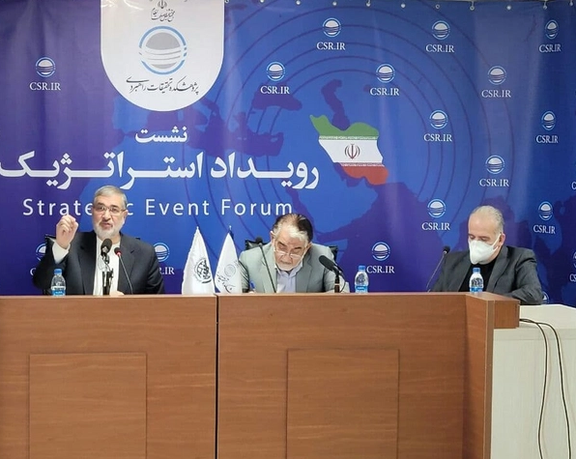Views Clash In Debate Over Iran's Foreign Economic Relations

A roundtable discussion in Tehran has revealed two different visions about the economic future of Iran - improved ties with the world or reliance on the East.

A roundtable discussion in Tehran has revealed two different visions about the economic future of Iran - improved ties with the world or reliance on the East.
At the two ends of the spectrum, a former ambassador to South Africa and former deputy oil minister Asghar Ebrahimi-Asl defended the strategy of relying on East, while the head of the Iran-China chamber of commerce Majid Reza Hariri spoke about the importance of foreign investments and strong ties with all economic powers.
Ebrahimi-Asl, who is a petroleum engineer reportedly with an MS degree from the University of Southern California (USC), criticized what he said was the policy of the former Rouhani administration in trying to improve ties with Europe and the United States. He was referring to nuclear negotiations with world powers that resulted in the 2015 nuclear deal later abandoned by former US president Donald Trump and the imposition of harsh sanctions.
Ebrahimi-Asl argued for Iran’s self-reliance, echoing arguments by Principlists and hardliners who follow Supreme Leader Ali Khamenei’s dictum. The former deputy oil minister insisted that fossil fuels will remain important well into the next decades and Iran has plenty of oil and gas reserves it can rely on. He also defended the view that the US is not a reliable country and will continue to plot against Iran.
Clearly, Ebrahimi-Asl said, the United States has faced defeats and failures while countries in the East and members of BRICS have become economic powers that Iran can rely on.
Majid Reza Hariri, with carefully observing the redlines of the Islamic Republic in public discourse, tried to put the emphasis on the acute need for foreign investments, which need good relations with the rest of the world.
First, he argued that the recent media and official emphasis on ‘economic diplomacy’ to boost trade suffers from a lack of clear definition. Iran’s decision makers should clarify what the term economic diplomacy means.
Hariri said that Iran chooses military influence in the region over influence in commerce with countries such as Iraq, Syria and Lebanon, but economic power is another important factor in strengthening national security.
The head of the China chamber of commerce implicitly referred to Iran’s policies which encouraged self-isolation after the 1980s Iran-Iraq war and said that if foreign companies had come and stayed in Iran and invested, it would have been much harder for others to impose sanctions on the country.
Hariri also drew attention to capital flight from Iran. He said capital that has left the country is three times more than foreign investments in the past three decades. He argued that state entities and three consecutive presidents since 1997 have failed to reach their targets in industrial development and expansion.
Hariri’s remark means that he is pinpointing inherent and systemic problems with Iran’s economic vision and policies, even before serious sanctions were imposed first by the United Nations from 2011-2015 and then by the US in 2018.
Hariri, at the end, emphasized the importance of economic ties with China but he also highlighted Iran’s favorable geo-economic position in the Persian Gulf and the Sea of Oman and argued for the country to expand on commerce and serve as an international commercial hub.